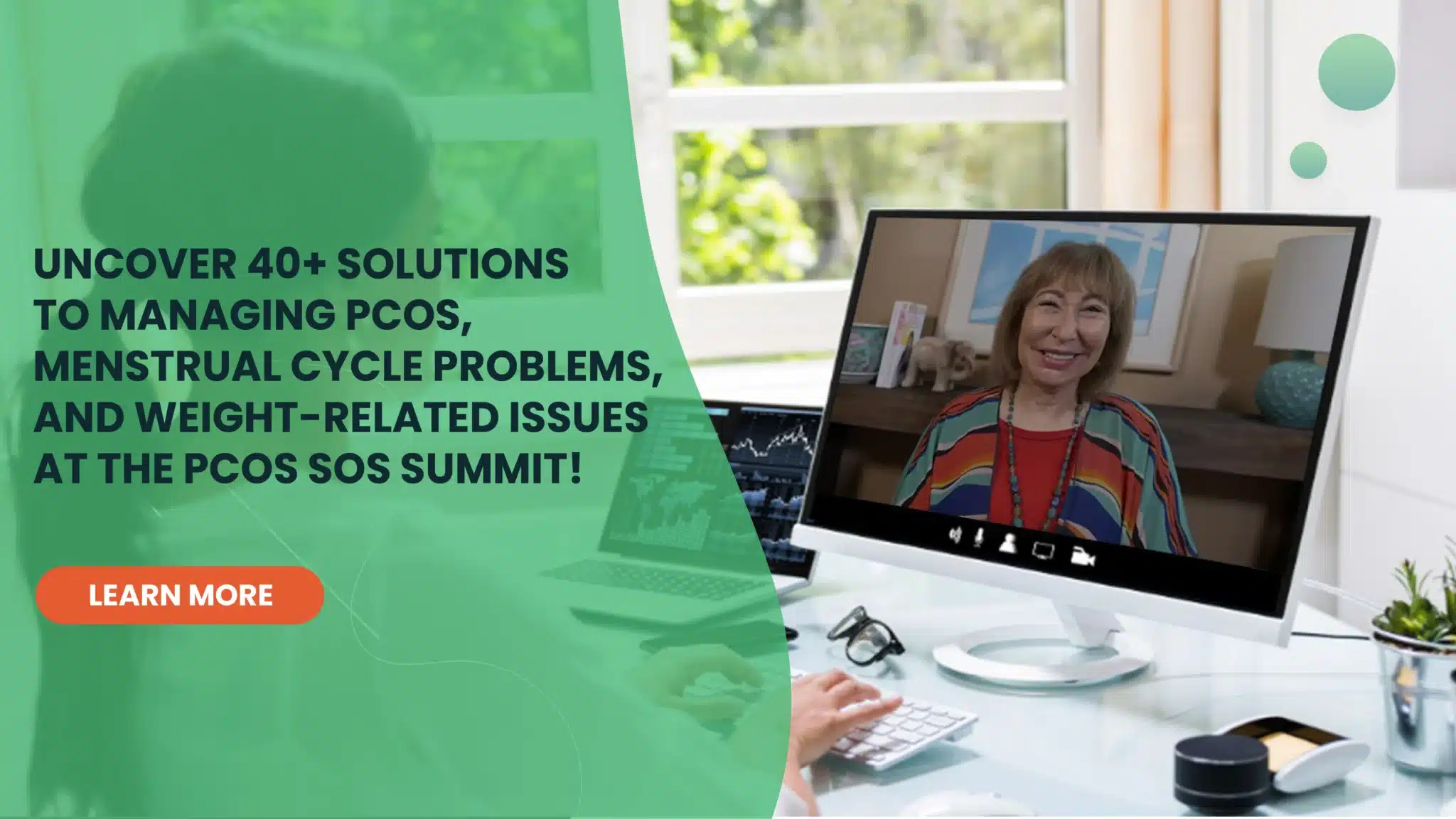|
Getting your Trinity Audio player ready...
|
PCOS – Key Takeaways
- Polycystic ovary syndrome, known as PCOS, starts during adolescence and is characterized by menstrual cycle problems and hormone imbalances.
- PCOS affects 8-13% of women and people assigned female at birth. It is one of the most common causes of infertility.
- The symptoms of PCOS can be managed with medication and lifestyle changes
View our PCOS Guide below to learn more about the symptoms, causes, and types of treatement associated with the Polycystic ovary syndrome.
What is PCOS?
PCOS stands for polycystic ovary syndrome. PCOS is one of the most common causes of infertility in women.
The World Health Organization (WHO) states that PCOS occurs when ovaries produce abnormal amounts of male sex hormones, which are called androgens. The symptoms of PCOS typically start during adolescence when menstruation begins.
PCOS affects 8-13% of women and people assigned female at birth worldwide, according to the WHO. What is more concerning is that up to 70% of women with PCOS may not know they have it.
The WHO states that PCOS can increase the chances of developing chronic health problems like:
- Infertility
- Heart Disease
- Cancer of the Uterus
- Type 2 Diabetes
- High Blood Pressure
- High Cholesterol
- Poor Mental Health
- Obesity
One PCOS expert, Felice Gersh, MD, has a dedicated PCOS Women’s Clinic as part of her Integrative Medical Group of Irvine. Dr. Gersh has discussed how PCOS is a whole-body endocrine disorder. Dr. Gersh is hosting a summit regarding how to treat PCOS symptoms.
In the following sections, you will learn what the symptoms of PCOS are as well as the current treatments and knowledge of how you can manage PCOS.
What are the Symptoms of PCOS?
According to the Cleveland Clinic, the most common symptoms of PCOS include:
- Infertility
- Abnormal Menstrual Cycles – Including heavy bleeding or abnormally high pain
- Obesity
- Increased Hair Growth – areas include the face, arms, and chest
- Changes to the Skin – Acne, skin tags, and darkening of the skin
- Hair Loss on the Scalp

How Does PCOS Cause Infertility and Abnormal Menstruation?
Infertility is one of the most concerning symptoms of PCOS. According to one report, infertility affects between 70-80% of women with PCOS.
So, how does PCOS cause infertility?
A 2015 review of PCOS states that hormone imbalance is the primary culprit. There are elevated levels of:
- Luteinizing hormone
- Androgens (testosterone, dehydroepiandrosterone, and androstenedione)
- Insulin
And reduced levels of:
- Follicle-stimulating hormone
- Estrogen
One report indicates that the hormone imbalances can lead to problems with egg development. The irregular hormone levels in PCOS change the environment in which eggs develop.
That report also states that PCOS causes problems with ovulation. Ovulation is when the ovary releases an egg.
The irregular hormone levels prevent proper signaling of the ovary and may lead to irregular ovulation timing.
Further, insulin resistance has been reported to cause irregular menstrual cycles as well as obesity.
How is PCOS related to Obesity?
The primary mechanism that causes obesity in PCOS is insulin resistance.
One report states that not only are insulin levels high in women with PCOS, sensitivity to insulin is also low. When the body can’t respond to insulin, cells cannot remove glucose from the blood well.
This results in high blood glucose levels and increased fat production by the liver. Ultimately, those are what causes metabolic dysfunction. This can lead to obesity and diabetes.
How to Improve Your Life with PCOS
There is no cure for PCOS. But many treatments and lifestyle modifications can be used to improve life with PCOS.
So, what treatments and lifestyle changes can help improve your life with PCOS?

- Access the PCOS SOS Summit
Learn from top leaders in the field the skills you need today.
Medications for PCOS
The first line of defense for PCOS symptoms are typically oral contraceptive pills, according to one key review. Oral contraceptives help lower the levels of androgens.
Oral contraceptives have been found to improve:
- Acne
- Hair Loss
- Facial Hair Growth
- Menstrual Cycle Irregularity
However, oral contraceptives are only useful in women not wanting to get pregnant. In women wanting to get pregnant, one drug used to treat infertility is clomiphene citrate.
Clomiphene citrate is reported to help improve ovulation and normalize the menstrual cycle.
Lifestyle Changes for PCOS
Improving symptoms related to PCOS is another way to improve life with PCOS. These lifestyle changes include:
- Eating a healthy diet
- Exercising regularly
- Taking appropriate supplements
According to one review, a healthy diet can improve insulin sensitivity and lower bodyweight. This could decrease the likelihood of having PCOS-related diseases, like diabetes or cancer.
Regular exercise helps improve mood, weight-related issues, and even stress levels.
Finally, one report indicates that vitamin D deficiency is common in women with PCOS. Supplementation of vitamin D could improve insulin sensitivity and mood.
There are many more treatments available to manage your PCOS symptoms
You can learn about how to utilize them and improve your life with PCOS at the PCOS SOS Summit hosted by Felice Gersh, MD.
Conclusion
PCOS is a relatively common condition in women and people assigned female at birth. It affects 8-13% of this population. PCOS comes with menstrual cycle challenges, insulin resistance issues, and infertility problems. Addressing PCOS with your doctor and discussing the available medications and lifestyle changes available to you could significantly improve your life.
PCOS Videos From DrTalks Experts
View these videos from experts on PCOS and hormone related conditions.
How Peptides Help with Fertility – Dr. Uzzi Reiss, MD
The Impact of Mycotoxins and Chronic Illness on Hormones
Health Disclaimer
The information provided in this blog post is for informational purposes only and should not be considered a substitute for professional medical advice. Always seek the advice of your physician or another qualified healthcare provider with any questions you may have regarding a medical condition. If you think you may have a medical emergency, call your doctor or 911 immediately
References
World Health Organization. (2023). Polycystic Ovary Syndrome. www.who.int. Read it here.
Cleveland Clinic. (2021). Polycystic Ovary Syndrome (PCOS) & Treatment. Cleveland Clinic. Read it here.
Melo, A. S., Ferriani, R. A., & Navarro, P. A. (2015). Treatment of infertility in women with polycystic ovary syndrome: approach to clinical practice. Clinics (Sao Paulo, Brazil), 70(11), 765–769. Read it here.
Dennett, C. C., & Simon, J. (2015). The role of polycystic ovary syndrome in reproductive and metabolic health: overview and approaches for treatment. Diabetes spectrum : a publication of the American Diabetes Association, 28(2), 116–120. Read it here.
Dumesic, D. A., Padmanabhan, V., & Abbott, D. H. (2008). Polycystic ovary syndrome and oocyte developmental competence. Obstetrical & gynecological survey, 63(1), 39–48. Read it here.
Li, X., Yang, D., Pan, P., Azziz, R., Yang, D., Cheng, Y., & Zhao, X. (2022). The Degree of Menstrual Disturbance Is Associated With the Severity of Insulin Resistance in PCOS. Frontiers in endocrinology, 13, 873726. Read it here.
Sam S. (2007). Obesity and Polycystic Ovary Syndrome. Obesity management, 3(2), 69–73. Read it here.
Sirmans, S. M., & Pate, K. A. (2013). Epidemiology, diagnosis, and management of polycystic ovary syndrome. Clinical epidemiology, 6, 1–13. Read it here.





